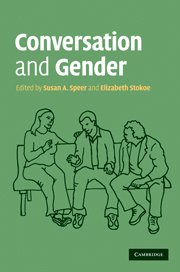Book contents
- Frontmatter
- Contents
- Contributors
- Data and transcription
- 1 An introduction to conversation and gender
- Part I Gender, person reference and self-categorization
- Part II Gender, repair and recipient design
- Part III Gender and action formation
- 8 On the role of reported, third party compliments in passing as a ‘real’ woman
- 9 ‘D'you understand that honey?’: Gender and participation in conversation
- 10 Bids and responses to intimacy as ‘gendered’ enactments
- Part IV Gender identities and membership categorization practices
- References
- Author index
- Subject index
8 - On the role of reported, third party compliments in passing as a ‘real’ woman
Published online by Cambridge University Press: 05 June 2012
- Frontmatter
- Contents
- Contributors
- Data and transcription
- 1 An introduction to conversation and gender
- Part I Gender, person reference and self-categorization
- Part II Gender, repair and recipient design
- Part III Gender and action formation
- 8 On the role of reported, third party compliments in passing as a ‘real’ woman
- 9 ‘D'you understand that honey?’: Gender and participation in conversation
- 10 Bids and responses to intimacy as ‘gendered’ enactments
- Part IV Gender identities and membership categorization practices
- References
- Author index
- Subject index
Summary
Introduction
My aim in this chapter is to examine the role of reported, third party compliments in transsexual patients passing as ‘real’ men or women. This research forms part of a broader conversation analytic (henceforth CA) study examining the vocal and embodied production of gender identities in interactions between transsexual patients and psychiatrists in a large British National Health Service (henceforth NHS) gender identity clinic (Speer & Green, 2007; 2008). The gender identity clinic (henceforth GIC) is a distinctive institutional setting where individuals who identify as transsexual and who (usually, but by no means always) desire male/female ‘cross sex’ hormones and ‘gender confirmation’ or ‘sex change’ surgery' (Press for Change, 2007: 2) attend for assessment by at least two psychiatrists. Gender clinic psychiatrists are renowned for acting as ‘gatekeepers’ to hormones and surgery (Speer & Parsons, 2006). They assess patients according to a pre-defined set of medical criteria, and aim to produce a ‘differential diagnosis’ (that is, to diagnose the type of gender identity disorder (GID) accurately and to determine that the patient is not suffering from some related or unrelated mental health problem). Although psychiatrists at the clinic in my data do not work with a standardized patient interview protocol, part of their concern when assessing patients is to examine their motivations for transitioning, and to judge whether or not they have a realistic view of themselves in their new role.
- Type
- Chapter
- Information
- Conversation and Gender , pp. 155 - 182Publisher: Cambridge University PressPrint publication year: 2011
- 14
- Cited by



